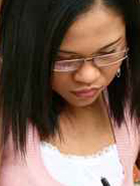Riley's STATEMENT OF PURPOSE
My thesis statement is
Women who receive microcredit without discussion support groups and classes in economics won’t know how to change the community conditions that encourage poverty;
therefore, microcredit should only be offered with such support.
My audience is others in class—and, of course, my teacher. From talking with the others in class, I know that even if they have heard about microcredit, they don’t know much about it. They’ve maybe heard of the man who started microcredit, Muhammad Yunus of Bangladesh, and how he won the Nobel Peace Prize in 2006. They’ve also only heard good things about microcredit. Unless I make my topic interesting to them, they’re probably not going to have much interest.
But when they are finished reading, I’d like my readers to be informed about what microcredit is and to understand how it’s way more complicated than just giving people small loans. I also want them to care about the women who need the loans, so that they can make good decisions about donating money to a microcredit organization if they want or about working with one.
I’m interested in this because I got all caught up in all the stories about microcredit when I first read about it: It was exciting to read about something that seemed so simple but that could make such huge differences in people’s lives. But then as I was doing more research I realized that all the promises people were making about microcredit mostly really weren’t coming true. They weren’t coming true because people’s lives are so much more complex than just some money can fix. It’s whole communities that need “fixing.”
So that’s why it seems like it’s so important that the loans be accompanied by support groups and classes, so that the women can really make the differences in their lives that seems possible. I wonder if I write my paper in the way that I learned about microcredit (first, how good it seems to be and then telling about the problems and why the problems exist), then maybe my readers will get caught up in it the way I did. All those stories of all those women going from having almost nothing to having their own businesses can suck you in, I think.
If I did that, it might just move my readers from caring about the women and their stories to caring about what doesn’t always work with microcredit. Then I can describe what needs to happen to make it work.








